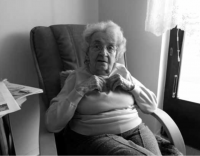We never knew when we would go to the angels
Halina Holbová, née Šzymanowska, was born on December 12, 1923 in Puławy (Poland). She grew up in the family of the Polish officer Miecisław Szymanowski and the Volhynian Czech Libuše Červená-Szymanowski. With the outbreak of World War II, her father was taken away in 1939, after the collapse of Poland‘s defense, he traveled to France and then to England, where he was treated for war injuries, which he eventually succumbed to. After his death, the witnesses with her brother and mother moved to relatives to Rovno to Volyn, where all three enlisted in the 1st Czechoslovak army corps in May 1944. The witness worked as an administrative assistant in the military headquarters and her mother became the interpreter of the General Jan Kratochvíl. The witness completed military training in Sadagura near the western Ukrainian town of Chernivtsi, and was subsequently deployed to the war front. After crossing the Polish-Slovak border, she was transferred from the typography to the 4th Personal Department of Colonel Apron and Captain of the Council, where she kept records of killed, missing and wounded soldiers. She went through the fighting of the Eastern Front to Prague, where a year and a half after the war she worked in Prague-Dejvice in the main staff in the records. She was demobilized on December 31, 1946. In Prague, she married the staff captain Antonín Holba, who fled to the West into the foreign army during the German occupation. He was released from the army after 1948 and subsequently arrested at the behest of the general and co-author of the army purges Bedřich Reicin. The detainee Antonín Holba was physically tortured in the so-called Hradčany House. He was convicted and imprisoned for several years in Pankrác and Opava. The witness and her two small children, aged two and three, meanwhile had to move out of Prague and lived in her husband‘s birthplace in Letovice. The practices of communist crime had a significant effect on her husband‘s health and he died soon after his release in 1953. For her military service, Halina Holbová received the Czechoslovak Medal for Merit of 1st degree (1947), the Soviet Medal for Victory over Germany (1948) and the Dukla Memorial Commemorative Medal (1959).
